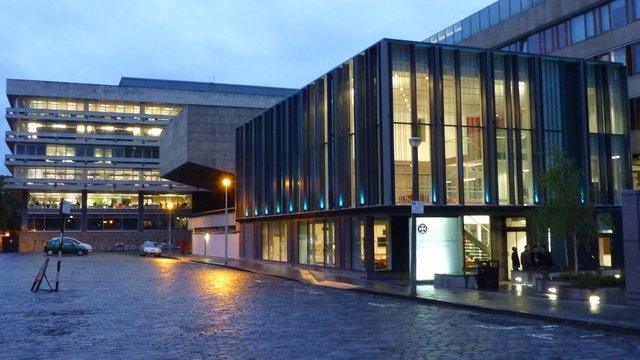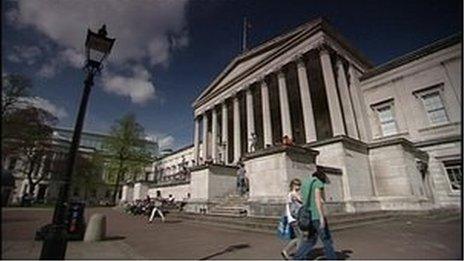Money is the key to being a top university, says study
- Published

Times Higher Education has identified the characteristics of the world's most successful universities
Money is key to being a top university, suggests analysis by Times Higher Education magazine, ahead of its 2014 world university rankings.
The UK had 31 universities in the top 200 last year but the leading 20 were dominated by wealthy US institutions.
The magazine says the average top-200 university has plenty of money and strong international links.
The Million+ group, funded by newer UK universities, said the "perspective" of the rankings was "very limited".
Times Higher says its analysis will help universities and countries that are aiming to reach the global peak of higher education.
Its top 200 ranking, due at the beginning of October, aims to identify the world's best 1% of universities
The analysis found the average top 200 university has 19% international students, hires 20% of staff from abroad and has at least one international co-author on 43% of published research papers.

Last year's top 20
California Institute of Technology, US
Harvard University, US
University of Oxford, UK
Stanford University, US
Massachusetts Institute of Technology, US
Princeton University, US
University of Cambridge, UK
University of California, Berkeley, US
University of Chicago, US
Imperial College London, UK
Yale University, US
University of California, Los Angeles, US
Columbia University, US
ETH Zurich - Swiss Federal Institute of Technology Zürich
Johns Hopkins University, US
University of Pennsylvania, US
Duke University, US
University of Michigan, US
Cornell University, US
University of Toronto, Canada
Source: Times Higher Education World University Rankings 2013

On average they have just under 12 students to one member of academic staff.
Their annual income - from government grants, student fees, investments and commercial fees - is worth worth some $750,000 per academic, says Times Higher.
Around a third of this is generated from research contracts in the form of government grants and fees from industry and commerce.
'Talented staff'
World Rankings editor Phil Baty said that while there was no single model of excellence for universities, the new information should give clear pointers on how to boost a university's international standing.
"Firstly, you need serious money. It is essential to pay the salaries to attract and retain the leading scholars and to build the facilities needed. Second, providing an intimate and intensive teaching environment for students, where they can expect to properly engage with leading faculty, can really help.
"Finally, and perhaps most importantly, a world-class university really must be international.
"It must attract the most talented staff and students from wherever in the world they happen to come from and bring people together from a range of different cultures and backgrounds to tackle shared global challenges - and it must work and think across national borders."
Pam Tatlow, chief executive of Million+, said: "These rankings provide a very limited perspective of university performance and are likely to exclude the majority of institutions, notwithstanding their excellence.
"The real risk is that governments are encouraged to think that it is more important to invest in a few universities rather than invest in a world-class system within their countries which is much more likely to benefit their national economies and society more generally."
The University Alliance of business-focused universities said using the rankings as a "roadmap" risked missing "the breadth of routes to delivering world-class research and graduates".
"The obsession with this idea of a 'world-class university' is a distraction from the tried and tested approach in the UK and elsewhere around the world, which is to identify and reward excellence wherever it exists," said a spokesman.
"We are all for celebrating excellence and success - let's just not get distracted by such a narrow and limited view of where it exists."
Dr Wendy Piatt, director general of the Russell Group of research intensive universities, welcomed the focus on research excellence and global collaboration but also stressed the importance of excellent teaching.
"Students at research-intensive universities get to work with the leading experts in their field and with a highly motivated and high-achieving peer group.
"They also have access to first-rate libraries and facilities and engage in research processes.
"Academic freedom, university autonomy and increased investment are also vital to the continued success of our universities. Universities will not flourish if they are over-regulated or underfunded."
- Published3 October 2013

- Published3 October 2013

- Published3 October 2012
- Published11 September 2012
